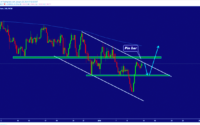Is a Global Recession Coming in 2024? How to Forex Trade Through the Storm
Introduction
The specter of an international recession looms big on the horizon as we input 2024, with monetary indicators flashing caution signs and symptoms of slowing growth, rising inflation, and geopolitical tensions. For foreign exchange investors, navigating through such turbulent times requires a keen understanding of macroeconomic developments, threat control techniques, and adaptability to changing market situations. This article delves into the possibility of a global recession 2024 and offers insights on how forex traders can climate the storm and capitalize on buying and selling opportunities.
1.Assessing the Risk of a Global Recession
Economic Indicators: Several monetary indicators can provide clues about the chance of an international recession, which include GDP increase rates, unemployment tiers, patron spending, commercial enterprise funding, and production interest. A sustained downturn in those signs throughout more than one economy might also signal the onset of a recession.
Central Bank Policies: Central banks play a vital role in coping with economic downturns through monetary coverage measures, which include hobby charge cuts, quantitative easing, and forward guidance. The moves and statements of essential imperative banks, the USA Federal Reserve, European Central Bank, and Bank of Japan, can provide insights into their assessment of monetary situations and ability coverage responses.
Geopolitical Tensions: Geopolitical tensions, including trade disputes, army conflicts, and diplomatic crises, can exacerbate monetary uncertainty and contribute to recessionary pressures. Heightened geopolitical dangers dampen investor self-belief, disrupt delivery chains, and weigh on international financial growth potentialities.
Inflationary Pressures: Rising inflationary pressures, pushed by using elements along with deliver chain disruptions, commodity charge increases, and expansive financial and financial guidelines, can erode customers’ purchasing electricity and squeeze profit margins for agencies, probably main to a slowdown in monetary interest.
2.Navigating a Global Recession in the Forex Market Trading
Diversification: Diversification is fundamental to mitigating hazards in a worldwide recessionary environment. Spread your trading portfolio throughout specific currency pairs, asset classes, and geographic areas to reduce publicity to particular dangers and increase resilience to marketplace downturns.
Safe-Haven Assets: Safe-haven properties, such as the American dollar, Japanese yen, Swiss franc, and gold, generally perform well throughout monetary uncertainty and marketplace turmoil. Consider allocating a portion of your portfolio to safe-haven assets to hedge recessionary risks.
Risk Management: Implement robust chance control strategies to defend your capital and decrease losses at some stage in intervals of heightened volatility. Set prevent-loss orders, restrict function sizes, and diversify trades to control danger correctly and maintain your trading account.
Fundamental Analysis: Conduct a thorough essential evaluation to evaluate the fitness of virtual economies, principal financial institution rules, and geopolitical trends. Stay knowledgeable about economic signs, imperative financial institution conferences, and geopolitical events that could impact forex markets.
Technical Analysis: Use specialized analysis equipment and indicators to identify key stages of assistance and resistance, trend reversals, and potential access and go-out factors inside the foreign exchange marketplace. Technical analysis assists you in making knowledgeable trading choices and navigating unstable market conditions extra efficaciously.
Adaptability: Be flexible and adaptive for your trading method, adjusting your strategies and approaches as market conditions evolve. Stay attuned to changing financial tendencies, important bank regulations, and geopolitical developments, and be prepared to pivot your buying and selling strategy.
Conclusion
While the possibility of a worldwide recession in 2024 looms as a sizable difficulty, foreign exchange investors can navigate through the hurricane by staying informed, diversifying their portfolios, imposing robust chance management techniques, and closing bendy and adaptive in their trading method. By assessing the risk of a worldwide recession, knowing its ability to impact forex markets, and using powerful trading strategies, forex investors can weather the storm and capitalize on buying and selling opportunities inside the ever-changing landscape of the forex marketplace.
FAQs
1.What are a few key financial indicators that could sign the onset of a worldwide recession?
Key economic indicators encompass GDP boom rates, unemployment stages, purchaser spending, enterprise investment, and manufacturing activity. A sustained downturn in these signs throughout a couple of economies may also indicate the opportunity of a global recession.
2.How do crucial bank rules impact forex trading at some point during a capacity global recession?
Central bank guidelines, including hobby rate cuts, quantitative easing, and ahead steering, can affect forex buying and selling by affecting foreign money valuations, investor sentiment, and danger appetite. Traders closely display vital financial institution moves and statements for insights into economic conditions and capability coverage responses.
3.Which secure-haven belongings tend to perform nicely during financial uncertainty and marketplace turmoil?
Safe-haven assets, which include the American dollar, Japanese yen, Swiss franc, and gold, are generally preferred by buyers at some point intervals of financial uncertainty and marketplace turmoil. These assets are perceived as much less at risk of recessionary dangers and provide stability and drawback safety for investors.
4.What are a few powerful hazard management strategies for foreign exchange traders navigating a worldwide recession?
Effective change control strategies include:
Placing prevent-loss orders.
Restricting function sizes.
Diversifying trades.
Allocating a part of the portfolio to secure haven assets.
Staying disciplined in adhering to threat control rules.
These strategies help shield capital and minimize losses at some stage in unstable marketplace conditions.
5.How can traders use fundamental evaluation to assess the impact of a global recession on forex markets?
Traders can use essential evaluation to evaluate the fitness of foremost economies, vital financial institution policies, and geopolitical trends. By staying informed about monetary indicators, imperative financial institution conferences, and geopolitical events, traders can count on ability market movements and adjust their trading strategies accordingly.
6.Why is adaptability important for forex traders navigating through a capacity international recession?
Adaptability is essential for foreign exchange traders navigating through a potential international recession because marketplace conditions can alternate swiftly. Traders should stay bendy and adaptive in their trading methods, adjusting their techniques and strategies as financial tendencies, central financial institution policies, and geopolitical trends evolve.


